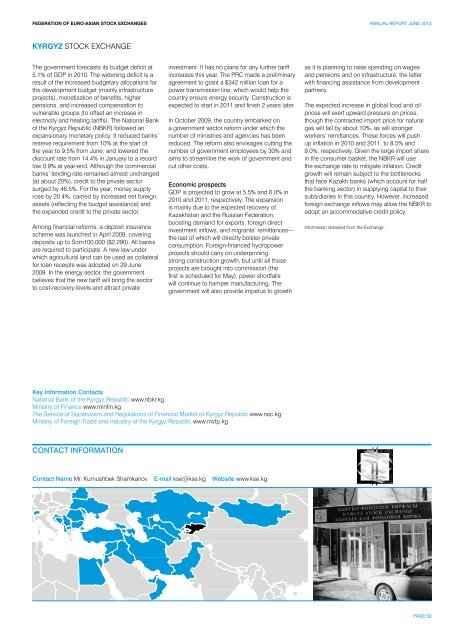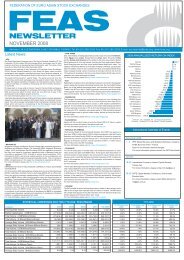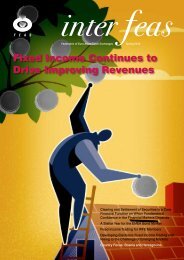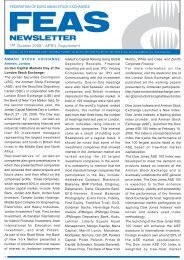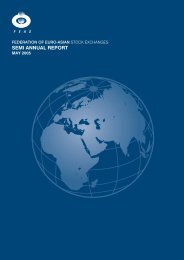JUNE 2013 - FEAS
JUNE 2013 - FEAS
JUNE 2013 - FEAS
Create successful ePaper yourself
Turn your PDF publications into a flip-book with our unique Google optimized e-Paper software.
FEDERATION OF EURO-ASIAN STOCK EXCHANGES ANNUAL REPORT <strong>JUNE</strong> <strong>2013</strong><br />
KYRGYZ STOCK EXCHANGE<br />
The government forecasts its budget deficit at<br />
5.1% of GDP in 2010. The widening deficit is a<br />
result of the increased budgetary allocations for<br />
the development budget (mainly infrastructure<br />
projects), monetization of benefits, higher<br />
pensions, and increased compensation to<br />
vulnerable groups (to offset an increase in<br />
electricity and heating tariffs). The National Bank<br />
of the Kyrgyz Republic (NBKR) followed an<br />
expansionary monetary policy. It reduced banks’<br />
reserve requirement from 10% at the start of<br />
the year to 9.5% from June; and lowered the<br />
discount rate from 14.4% in January to a record<br />
low 0.9% at year-end. Although the commercial<br />
banks’ lending rate remained almost unchanged<br />
(at about 20%), credit to the private sector<br />
surged by 46.5%. For the year, money supply<br />
rose by 20.4%, carried by increased net foreign<br />
assets (reflecting the budget assistance) and<br />
the expanded credit to the private sector.<br />
Among financial reforms, a deposit insurance<br />
scheme was launched in April 2009, covering<br />
deposits up to Som100,000 ($2,290). All banks<br />
are required to participate. A new law under<br />
which agricultural land can be used as collateral<br />
for loan receipts was adopted on 29 June<br />
2009. In the energy sector, the government<br />
believes that the new tariff will bring the sector<br />
to cost-recovery levels and attract private<br />
investment. It has no plans for any further tariff<br />
increases this year. The PRC made a preliminary<br />
agreement to grant a $342 million loan for a<br />
power transmission line, which would help the<br />
country ensure energy security. Construction is<br />
expected to start in 2011 and finish 2 years later.<br />
In October 2009, the country embarked on<br />
a government sector reform under which the<br />
number of ministries and agencies has been<br />
reduced. The reform also envisages cutting the<br />
number of government employees by 30% and<br />
aims to streamline the work of government and<br />
cut other costs.<br />
Economic prospects<br />
GDP is projected to grow at 5.5% and 6.0% in<br />
2010 and 2011, respectively. The expansion<br />
is mainly due to the expected recovery of<br />
Kazakhstan and the Russian Federation,<br />
boosting demand for exports, foreign direct<br />
investment inflows, and migrants’ remittances—<br />
the last of which will directly bolster private<br />
consumption. Foreign-financed hydropower<br />
projects should carry on underpinning<br />
strong construction growth, but until all those<br />
projects are brought into commission (the<br />
first is scheduled for May), power shortfalls<br />
will continue to hamper manufacturing. The<br />
government will also provide impetus to growth<br />
as it is planning to raise spending on wages<br />
and pensions and on infrastructure, the latter<br />
with financing assistance from development<br />
partners.<br />
The expected increase in global food and oil<br />
prices will exert upward pressure on prices,<br />
though the contracted import price for natural<br />
gas will fall by about 10%, as will stronger<br />
workers’ remittances. These forces will push<br />
up inflation in 2010 and 2011, to 8.5% and<br />
9.0%, respectively. Given the large import share<br />
in the consumer basket, the NBKR will use<br />
the exchange rate to mitigate inflation. Credit<br />
growth will remain subject to the bottlenecks<br />
that face Kazakh banks (which account for half<br />
the banking sector) in supplying capital to their<br />
subsidiaries in this country. However, increased<br />
foreign exchange inflows may allow the NBKR to<br />
adopt an accommodative credit policy.<br />
Information obtained from the Exchange.<br />
Key Information Contacts<br />
National Bank of the Kyrgyz Republic www.nbkr.kg<br />
Ministry of Finance www.minfin.kg<br />
The Service of Supervision and Regulations of Financial Market of Kyrgyz Republic www.nsc.kg<br />
Ministry of Foreign Trade and Industry of the Kyrgyz Republic www.mvtp.kg<br />
CONTACT INFORMATION<br />
Contact Name Mr. Kumushbek Shamkanov E-mail kse@kse.kg Website www.kse.kg<br />
PAGE 59


